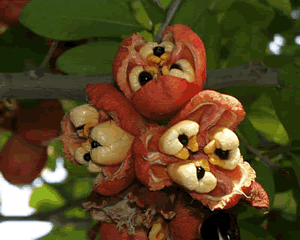THE JAMAICAN ACKEE (Who’s really benefiting from keeping ackee out)?
July 9, 2005 1:00:00 PM EDT

Ackee is a pear sized fruit, pinkish in color when ripe, and is found through out the Caribbean. In Jamaica, Ackee is a national dish, when cooked with saltfish.
Within the Jamaican ackee’s fruit outer shall are four yellowish fruits, each containing one black seed. The yellowish edible portion is separated from its seed, washed thoroughly of all red residue, then boiled in salt water until tender, it is then eaten with saltfish.
The Jamaican Ackee contains two toxic substances, Hypoglycin A and B, which can cause poisoning and death, if eaten forced ripe or green, this was also one of the primary reasons for its ban. The Food and Drug Administration (FDA) decided that until further testing could be done, the fruit would not be allowed into the country.
However, according to the Freedom of Information Act, there are no reported cases of ackee poisoning in the USA, and the occurrence of ackee related sickness in Jamaica was because the fruit was not washed thoroughly of all red residue before being eaten.
Most recently, a joint 5 year study between the University of Florida Food Sciences Department and USAID/Kington, Jamaica, produced new and improved research on safe canning methods and measurements of residues of Hypoglycin A, as well as the successful isolation of Hypoglycin A and B. Additionally, Jamaica’s Bureau of Standards now has the authority to ban from commerce, any food deemed unsafe, as well as the equipment to detect unsafe levels of Hypoglycine.
A most recent Import Alert #21-11, placed an automatic detention on all product types of ackees, frozen, raw, and dried, because the fruit still continues to be smuggled illegally into the U.S. through Canada.
Thus, the critical questions are, why is there still a ban after more than twenty five years?, given all the facts about the fruit’s safety, how does the hundred of Caribbean-American Restaurants in New York and across the United States satisfy the large demand for the fruit without jeopardizing their businesses?, and what is the position of the Jamaican Government regarding the ban when all studies indicate there is no danger in its consummation once prepared properly?.
The largest importation of ackee to Canada and Europe still comes out of Jamaica, and there are no reported cases of poisoning in these countries.
On August 11, 1993, Jamaica’s Ambassador to the United States, Dr. Richard Bernal, Dr. George Wilson, Director of Research at Jamaica’s Agricultural Development Foundation, Mr. James Kerr, Head of Chemistry at Jamaica’s Bureau of Standards, and Dr. Juliette Newell, manager of a Food Processing Company, visited the Deputy Director for Systems and Support at the FDA, to request that the F.D.A.’s Alert on imported ackee be lifted.
According to sources at the FDA, all that remains is for the Government of Jamaica to provide sufficient mechanisms including an approved program that would satisfy the FDA and (United States Department of Agriculture (USDA)), that the Monitoring and the Manufacturing process and practices for ackee is efficient and effectively in place. The timely accomplishment of these factors would most likely determine how soon the import alert and ban on ackee is lifted.
This was more than ten years ago, it’s now over twenty years later, So,WHAT’S THE PROBLEM…??
Most Jamaicans are forced to purchase the canned ackee from the Korean merchants, who buys the canned fruit in large quantities from those bringing it into the country. There is also an attempt to grow ackee in Florida, however, the soil produces a different brand of ackee unlike the Jamaican ackee. Someone has to be benefiting from the continued controversy and ban of ackee.
UPDATE: Finally,the ban on Ackee was lifted in July 2000, with the approval of two food processing plants, Canco Ltd and Ashman Food Products, at the forefront of the canning process. However, reports indicated that the black market prices seems to still be very much in effect and holding steady. Why??,..who’s really benefiting, certainly not the restaurants or the consumer, there even seems to be unhappiness at the lifting of the ban in certain quarters…
LATEST UPDATE: Ackee is again under serious scrutiny by the FDA, and on December 30, 2005, they announced a recall of Ashman’s shipments of Jamaican ackee, because of health concerns, yes, over the fruit’s naturally occuring toxin, hypoglycin once again. This latest recall involved 31 cases of Ashman’s ackees in Brine, distributed by Harvest Foods out of Hartford CT. and Shipped to retail stores and restaurants in Connecticut, Massachusetts and New York. Consumers are being urged to return their Ashman ackee products to the points of purchase.
Ironically, thirty something years ago, when ackee was first banned from the U.S., two competitive companies were shipping it into the U.S.,from Jamaica, one complained that the other’s ackee was poisonous,even though the ackee was being imported from the same place, so the FDA banned all shipments because of health concerns and until they could further study the problem, looks like we’re on that road again.
Posted in News By Trevor Fraser
